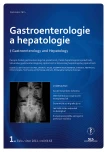-
Medical journals
- Career
Is it possible to reintroduce original biological therapy in a relapsed Crohn’s disease patient?
Authors: T. Zamborský; B. Desatová; I. Páv; M. Bátovský
Authors‘ workplace: Gastroenterologická klinika SZU a UNB Bratislava
Published in: Gastroent Hepatol 2011; 65(1): 33-35
Category: IBD: Case Report
Overview
Biological therapy has brought progress in the treatment of inflammatory bowel disease. It significantly improves the quality of patient’s life and postpones the surgical intervention. On the other hand, it raises the problem of its side effects, such as lymphoproliferative diseases in particular. Due to the risk of adverse side-effects of long-term treatment with biological agents, it is necessary to consider the options for stopping biological treatment without increasing the risk of relapse. In the case of relapse following discontinuation of biological therapy due to deep remission, it should be noted that in most cases it is possible to return to the previous biological therapy. In the vast majority of patients, the reintroduction of therapy is successful, and well tolerated. In our case we present a patient with Crohn‘s disease in deep remission during infliximab therapy and acute exacerbation after its discontinuation. The readministration was successful and no complications were recorded one and half years after the cessation of infliximab therapy.
Key words:
biological therapy – infliximab antibodies – TNF-alpha inhibitors risk of malignancy
Sources
1. Baert F, Moortgat L, Van Assche G. Mucosal healing predicts sustained clinical remission in patients with early-stage Crohn´s disease. Gastroenterologigy 2010; 138(2): 463–468.
2. Baert F, Noman M, Vermeire S et al. Influence of immunogenicity on the long-term efficacy of infliximab in Crohn’s disease. N Engl J Med 2003; 348(7): 601–608.
3. Rutgeers P, Sandborn WJ, Feagan BG et al. Infliximab for induction and maintenance therapy for ulcerative colitis. N Engl J Med 2005; 353(23): 2462–2476.
4. Bongartz T, Sutton AJ, Sweeting MJ et al. Anti-TNF antibody therapy in rheumatoid arthritis and the risk of serious infections and malignancies: systematic review and meta-analysis of rare harmful effects in randomized controlled trials. JAMA 2006; 295(19): 2275–2285.
5. Miehsler W, Novacek G, Wenzl H et al. A decade of infliximab: The Austrian evidence based consensus on the safe use of infliximab in inflammatory bowel diseasea. JCC 2010; 4 : 221–256.
6. Askling J, Fored CM, Baecklund E. Haematopoietic malignancies in rheumatoid arthritis: lymphoma risk and characteristics after exposure to tumour necrosis factor antagonists. Ann Rheum Dis 2005; 64 (10): 1414–1420.
7. Wolbink GJ, Vis M, Lems W. Development of antiinfliximab antibodies and relationship to clinical response in patients with rheumatoid arthritis. Arthritis Rheum 2006; 54(3): 711–715.
8. Radstake TR, Svenson M, Eijsbouts AM. Formation of antibodies against infliximab and adalimumab strongly correlates with functional drug levels and clinical responses in rheumatoid arthritis. Ann Rheum Dis 2009; 68(11): 1739–1745.
9. Bartelds GM, Wolbink GJ, Stapel S. High levels of human anti-human antibodies to adalimumab in a patient not responding to adalimumab treatment. Ann Rheum Dis 2006; 65(9): 1249.
10. Bartelds GM, Wijbrandts CA, Nurmohamed MT. Clinical response to adalimumab: relationship to anti-adalimumab antibodies and serum adalimumab concentrations in rheumatoid arthritis. Ann Rheum Dis 2007; 66(7): 921–926.
Labels
Paediatric gastroenterology Gastroenterology and hepatology Surgery
Article was published inGastroenterology and Hepatology

2011 Issue 1-
All articles in this issue
- Editor-in-chief´s lead article
- No country for young men
- Dynamic scintigraphy of the oesophagus in the diagnostics of gastro-oesophageal reflux disease
- Autoimmune form of chronic pancreatitis and IgG4 positive mastitis
- Cytomegaloviral colitis in organ transplant recipients
- Successful use of OTSC® (Over-The-Scope Clip) in the treatment of iatrogenic colon perforation
- Is it possible to reintroduce original biological therapy in a relapsed Crohn’s disease patient?
- What should be done in patients with inflammatory bowel diseases those lose a response to biological therapy?
- Not only NOTES in Barcelona
- Acute mesenteric ischemia
- Gastroenterology and Hepatology
- Journal archive
- Current issue
- Online only
- About the journal
Most read in this issue- Cytomegaloviral colitis in organ transplant recipients
- Is it possible to reintroduce original biological therapy in a relapsed Crohn’s disease patient?
- Acute mesenteric ischemia
- Autoimmune form of chronic pancreatitis and IgG4 positive mastitis
Login#ADS_BOTTOM_SCRIPTS#Forgotten passwordEnter the email address that you registered with. We will send you instructions on how to set a new password.
- Career

